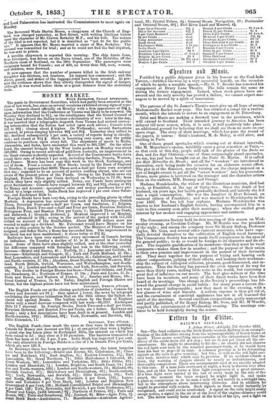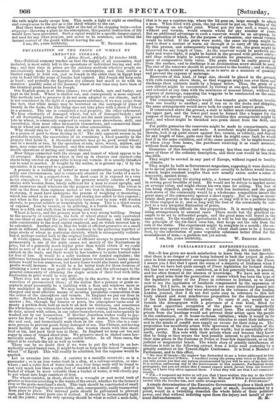Ttttn to tbt
RAILWAY SIGNALS.
1 Adam Street Adaphi 7th October 1853.
SLA-The fatal collision on the Irish South-western Railway is an exempli- fication of the difficulties arising from the unmanageability of heavy trains at speed. There seems something unaccountable in the circumstance that the driver of the cattle-train did not atop; but we do not vet know all the cir- cumstances. He might be attending to his fire ; he clearly did not observe the red light sent back by the retarded passenger-train, or be would have done his best to stop-if in time. A common practice is to fix detonating signals on the rails to give warning; but this, as well as the red light car- ried back, involves time which may be precious. If an accident retards a train, the warning of dangers should be nearly as instantaneous, and thoroughly conspicuous. There are arrangements used at sea exactly adapted to this case. If a man falls overboard at night, a buoy is thrown over after him, and on this buoy burns a blue light conspicuous at a great distance. If a blue light were carried at the tail of every train by the side of the guard, the moment the train stopped he might light it, and make a glare so conspicuous as to be seen a mile off, not merely in a straight line, but in the atmosphere above intervening obstacles. And in addition he might be provided with rockets. Such signals as these would instantly be recognized, and could not be overlooked. A signal on the rails might easily, escape notice, a signal in the air or at the level of the engine-chimney could. not. The driver usually looks ahead at the level of his eye, and a light on
the mile might easily escape him. This needs a light at night as startling and conspicuous to the eye as is the shrill whistle to the ear. Had there been a strong blue light at the tail of the stopping train—when stopping—throwing a glare in the atmosphere, this painful destruction of life would have been prevented. Such a signal would be a specific danger-signal, not used for any other purrose, and never to be mistaken, and within the instant control of the guard without leaving his seat.



























 Previous page
Previous page